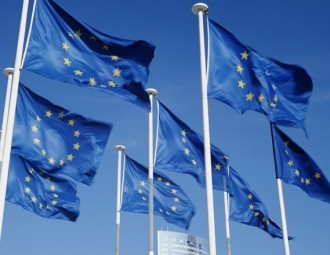Andrei Yahorau: Europeans are probing how the official Minsk understands geopolitical context

Belarus is now going through the pilgrimage of European officials. What are its aims and what these visits can lead to?
On February 19 the Latvian Foreign Minister Edgars Rinkevics visited Minsk. Yesterday Andrea Rigoni, rapporteur of the PACE's Committee on Political Affairs and Democracy started its visit to Minsk. In the next few days Belarus will also welcome Sandra Kalniete, vice-chairman of the European Parliament for the European People's Party.
On February 24 with the official visit to Minsk came Helga Schmid, deputy secretary general of the European External Action Service together with Gunnar Wiegand, director for Russia, Eastern Partnership, Central Asia, Regional Cooperation and the OSCE at the European External Action Service. On February 24 they met with the representatives of the Belarusian Helsinki Committee, “Viasna” Human Rights Center, the Belarusian Institute for Strategic Studies, International Consortium “EuroBelarus”, a prisoner rights group called Platform Innovation, the Belarusian Association of Journalists (BAJ), and the Assembly of Pro-Democratic Non-Governmental Organizations.
The reasons of the European pilgrimage and its consequences for Belarus-Europe relations in the interview with “EuroBelarus” Information Service explains Andrei Yahorau, co-chair of the Eastern Partnership Civil Society Forum, the Director of the Center for European Transformation.
- What events did lead to the invasion of European officials to Minsk? Belarusan society didn’t see and didn’t hear any signals of the official Minsk that demonstrated the readiness of the authorities to the European turn, did it?
- From my point of view, restoration of relations between Belarus and the EU has its internal logic: it has been happening since the end of 2014, but started even earlier, and these processes are now being actualized.
Besides, Belarus’ position on Ukraine also affects the positive dynamic of bilateral relations’ restoration.
Restoration of relations between Belarus and the EU is linked to the inner logic of relations and the forthcoming president election. Belarusan authorities are passing a test re the perspective of the relations’ development after the presidential campaign. Europeans are probing how the official Minsk understands geopolitical context and are trying out what can be expected in relations with Belarus before and after the presidential campaign.
- The relations between Belarus and the EU are clearer now than they used to be, noted Lukashenka at the meeting with Shmid. What trends in Belarus-Europe relations have begun to show now, on the threshold of the presidential campaign?
- Belarus and the EU enter the final stage of negotiations on the “European Dialogue on Modernization with Belarus” program. The parties have already discussed the problems of mutual trade, investments, WTO; on March 9 the final round of negotiations will start, in the course of which problems of court reform, electoral legislation, and human rights – now these are the most difficult problems in the bilateral relations.
In the future, if the Belarusan regime will decide to release the political prisoners, the results of negotiations might be embodied in EU’s real actions, as according to the EU’s representatives these issues are not taken away from the agenda.
- Lukashenka is imposing his peacemaking to the EU, and is making it really confidently. “Belarus is one of the countries that could play an important part in building up a safe Europe,” – the Belarusan leader marked. Will the Belarusan peacemaking open a window to Europe?
- Largely neither the real situation in Belarus nor the geopolitical weight allows Belarus to play role in providing safety for whoever it might be. Belarus is Moscow’s satellite, which makes it unable to be an element of global safety.
Europeans need Belarus to be neutral in relation to Ukraine; it is important that Belarus supports territorial unity and its neighbor’s sovereignty, which the official Minsk does, though very inconsistently. Lukashenka is using the fact that Belarus has become a negotiation area on settling the Ukrainian crisis, and he makes it very successfully, keeping to a line about Belarus’ need for ensuring the country’s sovereignty. Belarus feels the threat from Russia; and to avert it closer ties with the EU are needed.
And Europe accepts that, even though the official Minsk demonstrates no progress in fulfilling its obligations.
- At the meeting with Shmid Lukashenka talked about the cooperation within the formula “from Lisbon to Vladivostok”. Is Minsk trying to promote itself as a mediator between the EU and the EEU?
- Not only Lukashenka, but also some Russian diplomats are using this formula. However, this is impossible due to two reasons. First, complete incompatibility of the two integration initiatives that are being built on completely different principles; secondly, the role of Minsk in the EEU doesn’t provide for being a mediator; no one gave it the required authority. Belarusan authorities have neither weight, nor formal mandate for the role of a negotiator, which turns the voiced idea into a fiction.
But it is possible to speculate on this, which Lukashenka is doing quite successfully.
- The official Minsk and personally Aliaksandr Lukashenka demonstrate huge interest to the “Eastern Partnership”, which had never happened before. Does Lukashenka really want to come to the summit in Riga that much?
- It is rather vice versa: the approach of the summit in Riga explains European pilgrimage.
Lukashenka isn’t dying to come to the summit in Riga, so he won’t makes any steps to release political prisoners. And Lukashenka’s participation doesn’t have a principal meaning.
Whereas pro-European rhetoric is often related to mere pragmatic interests: economic cooperation, investments, access to financial institutions, realization of bilateral programs.
-
03.01
-
07.10
-
22.09
-
17.08
-
12.08
-
30.09








































